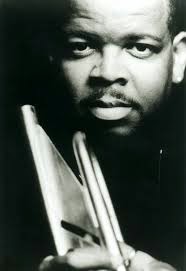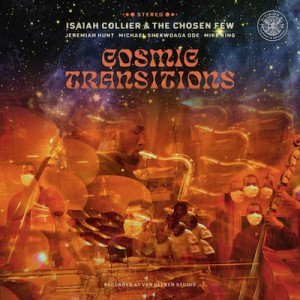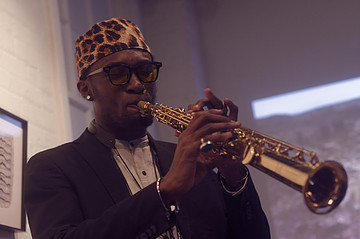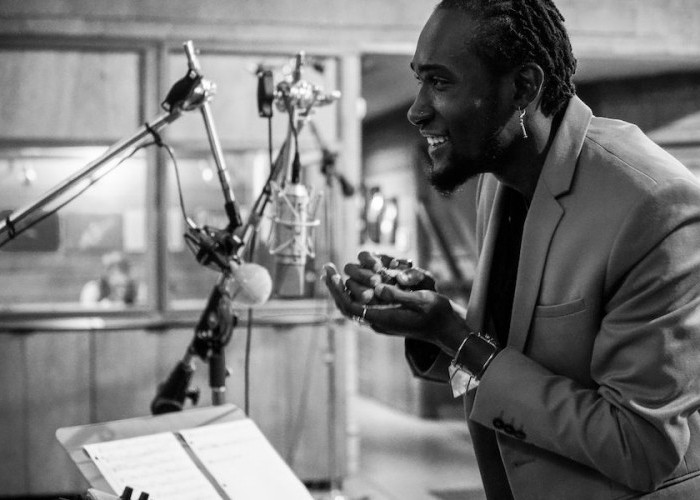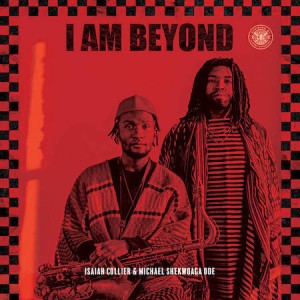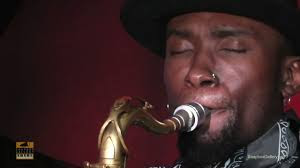SOUND PROJECTIONS
ISAIAH COLLIER
(November 26-December 2)
SAVANNAH HARRIS
(December 3-9)
MIKE KING
(December 10-16)
JOSH EVANS
(December 17-23)
ORRIN EVANS
December 24-30)
NASHEET WAITS
(December 31-January 6)
MARCUS SHELBY
(January 7-13)
https://www.chicagojazzmagazine.com/post/saxophonist-isaiah-collier
The Future Is Now: Isaiah Collier
April 10, 2019
Chicago Jazz Magazine

Twenty-year-old Isaiah Collier is a musical virtuoso in the truest sense of the phrase he began playing saxophone at age 11, and his intuitive proficiency earned him attention early on.
One of his first music teachers was Salvation Army Englewood minister and captain, Julian Champion. It was Champion’s mission to put instruments in the hands of children from Southside communities. “Champion created a jazz band specially for me,” says Collier.
One of his earlier performances with the Salvation Army band featured saxophonist Al Smith as a guest artist. “We played “A Night in Tunisia.” I was nervous,” Collier recalls. It was his first time playing outside of Chicago, in St. Louis. “Al played a flawless solo, in the spirit of Bird.” Collier followed. “When it got to me, my mind went blank. I don’t remember what I played, but the response was overwhelming. A lot of things changed after.”
Isaiah Collier comes from a talented family. Both his parents sing and play instruments as well. “Music was always there,” he says. He first sang in the church choir, and was playing piano and flute, when his older brother initially introduced him to the saxophone.
I first heard Collier play the California Clipper with the band Die Stadtmusikanten. There’s a regal, elegant manner to his stage presence: he’s over 6 ft. tall, thin, deep brown, with high cheekbones. When not playing, he is patiently waiting—not contemplating his next move, but listening to the musicians that accompany him, listening to their stories. The patience he has for other musicians is also applied to his own solos—sometimes creating longer, elaborate solos, always with a greater context in mind. “I’m just into composition,” says Collier. He explained he’s never really hearing himself, he’s hearing other people: some people have fire, others have air. “That’s how I hear, there has to be a balance.”
His sound is a dynamic flurry of metaphors, yet he can hold back when necessary. His playing is often described as mature yet youthful. “I think people see youth and hear maturity,” is Collier’s response to that description. He reminds me that Miles Davis was 19 when he was on the road with Charlie Parker.
He plays his influences, which he describes as a “sonic time machine; you can’t really put a time or destination on it.” In terms of where he plans to take his music, Collier says, “I reach backwards and I reach forwards simultaneously when creating art and what is ahead of me is the past.”
Collier’s persona on stage differed from his persona when he sat down with me to discuss his craft and upcoming projects. Collier acknowledges Chicago defines his music. He attended high school at ChiArts, which was located in Chicago’s Bronzeville neighborhood at the time. After, he attended the Brubeck Institute in Stockton, CA for two years.
Collier didn’t realize Chicago’s vast influence on music until he started traveling to New York, the West Coast, and the southern states. He learned those regions have a lot of Chicago influences, and that the South’s music culture is deeply ingrained in Chicago’s. He points to artists like pianist Lennie Tristano and alto saxophonist Lee Konitz, both born and raised in Chicago who later moved to the West Coast, as major influencers of the “non-swinging school of jazz music—that sound has its origins in Chicago,” says Collier.
Other Chicago artists that mentor and influence Collier are pianist Robert Irving III, saxophonist James Perkins, saxophonist Ari Brown, and pianist John Wright, who “recommended I learn the jazz language and develop more of an understanding of the jazz vernacular.” Collier says his mentors offer perspective in opening his views compositionally and harmonically. He doesn’t take critiques from these great artists as criticism. “If you take it personally, you don’t value what they are saying. Not everyone is going to offer advice, they have to feel it,” says Collier.
Collier’s used his latest recording with his band, the Chosen Few, as a platform to feature a few of Chicago’s hidden talents. Return of the Black Emperor was recorded primarily at the Frontier, a live space in Rogers Park. On piano is Evan Swanson (3 tracks) and William Kurk, Caesar Martinez on guitar, James Wenzel on bass and his brother, Jeremiah Collier, on drums. Many of the harmonies on this recording are reminiscent of Coltrane tunes, and Collier takes the freedom to unload his virtuosic saxophone skills.
Collier will release Collier Plays the Blues this summer. It will include all original compositions. A second recording of all original compositions, Welcome to Hyde Park, will also be released this summer. “It’s an interesting way of sonically describing what Hyde Park is,” says Collier. It will pay homage to Hyde Park landmarks. A few of the songs are titled “Hyde Park Records,” “Frontline,” and “DuSable”—which honors Dr. Carol Adams.
Visit Isaiah Collier's Facebook page for more information
https://de.wikipedia.org/wiki/Isaiah_Collier
Isaiah Collier
Isaiah Collier ( born 1998 ) is an American jazz musician ( tenor saxophone , composition , also piano , drums ) who is active in the Chicago jazz scene. [1]
Collier grew up in a musical family; he first sang in the church choir and first played the piano and flute before his older brother introduced him to the saxophone. He started playing the saxophone at the age of eleven. One of his first music teachers was a Salvation Army preacher in Englewood, who started a jazz band especially for him. He attended Chicago Arts High School in the Bronzeville neighborhood of Chicago. He then studied for two years at the Brubeck Institute in Stockton, California. Chicago artists who mentored and influenced Collier include pianist Robert Irving III and John Wright , and saxophonists James Perkins and Ari Brown. [1]
Collier then gained his first performance experience in the band Die Stadtmusikanten [sic], before he played in Ernest Dawkins ' Young Masters Quartet from the mid-2010s , with whom he made his first recordings. [2] With his own band Isaiah Collier & The Chosen Few , he released his debut album Return of the Black Emperor in 2019 . He can also be heard (also as a drummer) on the album LIVE by Angel Bat Dawid & Tha Brothahood, which was produced at JazzFest Berlin in 2019 . With his band The Chosen Few he released the album Cosmic Transitions in 2020(Division 81), which he recorded with pianist Mike King, bassist Jeremiah Hunt and drummer Michael Shekwoaga Ode. The music on the album, written on September 23, 2020, the date of birth of John Coltrane , is hardcore spiritual jazz , in the spirit of Coltrane's 1965/66 work and later Pharoah Sanders records , according to Phil Freeman. [3] Among his main influences, Collier counts the jazz tradition of the American South, but also of Chicago.
Discographic notesTo edit
- Ernest Dawkins: Coming of Age: Live the Spirit Residency Presents the Young Masters (2016)
- Isaiah Collier & The Chosen Few: Return of the Black Emperor (Good Vibes Only, 2019), starring Cesar Martinez, James Wenzel, Jeremiah Collier, William Kurk [4]
- Isaiah Collier & The Chosen Few: Cosmic Transitions (Division 81, 2020)
- The Kahil El'Zabar Quartet: A Time for Healing (2021)
- I AM: Beyond (2022), with Michael Shekwoaga Ode
web links
To edit
- interview
- Isaiah Collier at AllMusic
- Isaiah Collier at Discogs
https://southsideweekly.com/sonic-chemistry-saxophonist-isaiah-collier/
The Sonic Chemistry of Isaiah Collier

We have so many millennia of information recorded in our frickin’ DNA, and all it takes is the right time and place to trigger it,” says saxophonist Isaiah Collier. “Something like that happens for me sonically.”
At twenty, Collier has already shared a stage with Chance the Rapper and appeared at jazz festivals across the world. These accolades make his disarming charm and unassuming composure all the more striking. I sat down with him a few weeks ago to discuss his musical philosophy over a plate of sushi. Under the looping choruses of Top 40 hits, we talked about everything from genetics to folk music.
Collier’s roots in the Chicago jazz scene run deep. A Park Manor resident and a graduate of the Jazz Institute of Chicago, he recently returned to his hometown after spending a few years at the Brubeck Institute in Stockton, California. Mentorship by local giants like Willie Pickens and James Perkins Jr. has given way to performances with the Chicago Symphony Orchestra and, most recently, with his own band, The Chosen Few.
But Collier’s introduction to the world of jazz had a decidedly humbler tone. Less than a decade ago, a flyer for a music camp caught in a Chicago breeze landed fortuitously in his mother’s face, giving him his first shot at the saxophone. Years went by and his passion grew. His father, a keyboardist and singer, would bring a twelve-year-old Collier to play along at gigs. “And I was like, ‘Oh crap! I made twenty bucks doing that!’ But it really put some perspective on it,” Collier said. He remembers thinking, “Wait, I can actually make some money doing this?” Soon, Collier would be playing for his local church, reviving the classic R&B tunes he heard as a child for new audiences.
Collier discovered the philosophy behind jazz from an unlikely source. “I was hanging out with one of my dad’s friends who was trying to help me improvise, and he told me, “Learn how to play ‘Happy Birthday!’” Collier exclaimed, “Anyone can play a song, but it doesn’t speak, have meaning… It’s all about making it yours. If everyone is saying the same thing, then you’ve got a problem.”
From there, his musical career grew, taking him to jazz festivals from Hyde Park to California. It culminated in the formation of his band, Isaiah Collier and the Chosen Few. In 2017, the group independently released its first album, Return of the Black Emperor. The haunting ballad “I Am Who I Be” lines up next to the seismic bursts of “War Song” and the evocative wails of “Mali,” each displaying Collier’s versatile style. But it is the title song, “Return of the Black Emperor,” that demonstrates the heart of Collier’s approach to his craft.
On one level, the listener hears an assured conversation with the legends of saxophone as he channels the creative force of John Coltrane and Wayne Shorter. But Collier doesn’t aim to mimic these giants of the genre. “It’s a dialect I understand,” he commented, “Like, when I think about Charlie Parker and all these cats, I’m not thinking about sounding like them: it’s a style. You’ve gotta be vulnerable enough to put yourself out there.” Instead, he injects his interests—from Mayan folk music to flamenco—into the picture.
As he describes it, music, like déjà vu, activates something buried in his subconscious. “I think it really just comes down to a genetic thing. Part of you has been somewhere that made this kind of music.” Collier is fascinated by how genetics, history, and music might operate in tandem. Jazz, like hip-hop, relies on excavating the rhythms and chords latent in our cultures and retrofitting them to speak to present concerns. “It’s weird,” he pondered, “it’s like we’re reaching backward and forward at the same time.”
In an era when opportunities for young artists are shrinking as clubs shut their doors, school arts budgets are cut, and record companies pursue algorithmically-crafted pop progressions for the mass market, Collier is trying his hand at preserving accessible jazz education for kids.
He’s conducted master classes at Chicago High School for the Arts and at several schools on the South Side, and has been involved with the Association for the Advancement of Creative Musicians (AACM) of Chicago. “It’s in [kids’] blood; they don’t know unless they try,” Collier said. “And there are so many different versions of themselves, but they need to have an example.”
In his eyes, the perpetual struggle of the Black community in America has motivated near-continuous bursts of artistic innovation that have snowballed over time. Jazz embodies that legacy. “If you wanna talk about jazz, we gotta start further than that, with gospel, and if you wanna talk about that, then we gotta start with the blues, and for that, we’ve gotta talk about ragtime, and the Negro spirituals. It’s like we’re telling [all those stories] at once,” Collier told me with a smile. “It’s the message of the ancestors, man.”
And those ancestors speak loud and clear in every chord, blues progression, and vocal harmony. “We have to stress the history. I try to make sure that the children know that. I’m telling you to know your history. Because that’s what makes jazz so unique. It’s tailor-made for everybody who plays it. Any of us can come from different perspectives on it, and that’s what makes it so infinite.”
As we spoke, Collier reflected on how one of his mentors, James Perkins Jr., once inquired about his algebra skills. “And I would wonder why he was asking me this,” Collier mused, “And he’d say, ‘There’s no difference.’” His confusion, he remembered, soon gave way to epiphany. “They’re all utilizing the same type of properties. Music is just a sonic version of chemistry. It’s a giant painting, in a museum we can all visit.”
Towards the end of our conversation, Collier showed me an image on his phone. Mistaking the star-shaped drawing for some kind of Da Vinci diagram, I asked him what it meant. “It’s John Coltrane’s spiritual geometry,” he said, “his Circle of Fifths, for ‘A Love Supreme.’” Considering that pentagram, with its intricate lines producing an eerie symmetry, I felt the gravity of Collier’s words on jazz. Mathematics, science, music—glued together through the sheer force of belief. Sonic chemistry, indeed.
Krishna S. Kulkarni is a Master’s student at the University of Chicago, where he studies Middle Eastern history. He writes about food, music, and the people who craft them. He lives in Kenwood.
https://www.hpherald.com/arts_and_entertainment/hear-isaiah-collier-and-the-chosen-few-rehearse-each-week-at-the-connect-gallery/article_cf142846-adc7-11eb-ba2d-bf16983a5d7c.html
Hear Isaiah Collier and the Chosen Few rehearse each week at the Connect Gallery
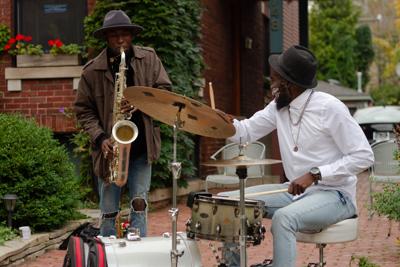
PHOTO: Isaiah Collier (left) performs with brother Jeremiah during a performance at last year's Hyde Park Jazz Festival.
On Tuesday evenings, anyone walking through Harper Court will be pulled in by the sounds coming from the Connect Gallery. Upon peeking inside, many may decide to stop and enjoy the musical stylings of Isaiah Collier as he rehearses with an ensemble of his band, The Chosen Few.
The weekly rehearsal, open to the public, is an attempt to build community and bring people together during the pandemic, 22-year-old jazz saxophonist Collier said. He also enjoys giving people a chance to see how big shows come together.
“I was just like, okay, let me debunk the myth of it. But this is also performance art. So it makes it more appropriate to bring both the visual arts and the sonic arts together,” he said, adding that it gives musicians an experience of dealing with their nerves.
Though they share the same name, Collier’s Chosen Few band has no relation to the DJ group that puts on an annual house music picnic in Hyde Park. Instead, the name was inspired by his uncle’s bikers club, the One Percenters AKA The Chosen Few. (But Collier does get asked about the correlation to the DJ group a lot, and says he’s open to doing a collaboration with them anytime.)
Rob McKay, owner of the Connect Gallery, 1520 E. Harper Court, said that he and Collier got to know each other after the saxophonist played the Silver Room Block Party one year. They had been thinking of collaborating before the start of COVID, but the idea for the open rehearsals arose during the pandemic. They started the performances this February.
“He and I would come in the gallery and I just let him practice. [We said] once things start opening up we’re gonna hit it. We want people to experience something, something that inspires them,” he said.
During this Tuesday’s rehearsal, Collier was in his element as he directed the band, which gradually grew in size as more members trickled in — giving them pointers, boosting their confidence, and encouraging them to push through the performance. The intimate and artsy ambiance at the gallery added to the experience.
Though Collier is mostly associated with his talents on the saxophone, during the rehearsal he could be seen on the keyboard, directing the horn section as well as the bass and drums. He said that he decides what’s needed from him based on the jobs he’s doing.
“I call myself a sonic scientist because it's all sounds and it's also going to be taken apart and put together and dissected and reconnected and be reimagined,” he said. “My thing is just to test all the different variables there are...I just want to continue to explore all the different avenues of our culture to the fullest.”
As a young jazz musician, Collier feels that he has a duty to bridge opposing sides when it comes to music. Not a lot of people in his generation are hip to jazz music because of how it’s presented, he said.
“So when we present it in a palate of connectedness we say okay, you don't believe me when I say this stuff came from this, so let me show you,” Collier goes on to explain how Earth, Wind & Fire started off as a jazz band, giving the example that music is more connected than people realize — a point that he hopes to make during the open practices.
But Collier also places blame on older musicians who complain about the new music coming out and point out what it’s lacking, wondering why they don’t work to fix the problem on their own. In that sense, the open rehearsals are a kind of “do it yourself” project for him — it's been paying off so far.
Isaiah Collier at the Connect Gallery, 1520 E. Harper Court. Tuesdays at 7 p.m. - 9 p.m. $5+ suggested donation.
Connect Gallery also hosts open rehearsals with Micah Collier on Fridays, starting at 7 p.m.
Collier will be playing at The Quarry Event Center at 7 p.m. and Andy Jazz Club at 10:30 pm this Friday, May 7.
https://wjct.org/jme/2022/02/isaiah-collier-lift-every-voice/
A Stunning New Take on “Lift Ev’ry Voice and Sing” from Isaiah Collier & The Chosen Few
Jazz prodigy breathes new life into the iconic Johnson Brothers' song

We’ve written in the past about “Lift Ev’ry Voice and Sing, the classic penned by Jacksonville’s own James Weldon and John Rosamond Johnson in 1900, which has found a vast range of expression over the decades, en route to becoming (soon) the official National Hymn of this country. You can now add a surprising new entry to the long list of legends who’ve taken this vocal vehicle around the block: Isaiah Collier & the Chosen Few.
One of the rising stars of the Chicago music scene, at just 23, Collier is releasing “Voice” as a single, b/w “Guidance” (Yoruba Soul Mix) on Division 81 Records. It’s the only cover on an album otherwise comprised of originals. “Cosmic Transitions” was recorded in just one day–to be specific, September 23, 2020. It would’ve been John Coltrane’s 94th birthday, and Collier had written an entire five-part suite in tribute to his predecessor on the tenor saxophone. Joining Collier on the track: the Chosen Few, which includes, Mike King on piano, Jeremiah Hunt on bass and Michael Shekwoaga Ode on drums.
Lift Every Voice · Isaiah Collier & The Chosen Few
Lift Every Voice
℗ Division 81 Records
Released on: 2022-02-22
Composer Lyricist: Isaiah
Composer Lyricist: Sonny Daze
The historical implications of this recording is boosted, given that it was recorded at the legendary Rudy Van Gelder Studios in Englewood Cliffs, NJ. Van Gelder (1924-20160 was arguably the most important music producer in history (but that’s a debate worth having), known primarily for his work with record labels like Riverside, Prestige and especially Blue Note. He also worked extensively with Coltrane during his most formative period; his first 18 studio albums were recorded at the original RVG studio in Hackensack (which Monk wrote a song about), as well as later classics like “Ascenscion” and “A Love Supreme”.
Basically, all of Coltrane’s recorded work, aside from a brief period at Atlantic Records, was somehow filtered through the auditory aesthetic of Mr. Van Gelder–who, incidentally, helped usher in the concept of the “live album” through his recording of Coltrane at the Village Vanguard in 1961.
All this adds an extra layer of synchronicity to Collier’s rendition of “Lift.”
“We decided to go into the Studios of Rudy Van Gelder’s for a couple of reasons,” explains Collier. “That’s because we were enduring another struggle in Black culture/America, and ‘Lift Every Voice’ serves as an ode to our survival. Our never yielding faith and also as a requiem for every person who was a Black American and was slain unjustly. Persecuted, prosecuted and even stripped of dignities being seen as men, women and children.”
As one might expect, the combination of music and musicians, setting and sentiment, made for a perfect storm of creativity, and the results are stunning. “Cosmic Transitions” was an immediate entry on the list of best jazz albums of recent years. It’s incredible to consider that the whole thing was recorded in just one day, but then again, that would be very consistent with the kind of work-rate the men like Coltrane and Van Gelder were known for.
“‘Lift Every Voice’ reminds us to weather the storm and remember that the sun always comes shining through. ‘God of Our weary years, God of our silent tears.’ It’s a song that speaks to everyone who faces adversity on a daily basis. Our hearts sing with determination and resolve. We will continue until victory is won.”
The Johnson Brothers would be surely thrilled to hear this record, and so will you.
Arts & Entertainment
Isaiah Collier: An Emerging Chicago Talent in Jazz and Blues
With a new record in the wings - and concerts around the world - one of Chicago's hidden musical talents is increasingly becoming not so hidden.
Isaiah Collier plays saxophone, piano, drums - you name it. He recently turned 21 years old - but musically, he is an old soul. We met him at his family home.
TRANSCRIPT
Jay Shefsky: Music spills out of a brick bungalow in the Park Manor neighborhood on the South Side.
Isaiah Collier , musician, composer: We talk about how the saxophone is probably one of the closest instruments to the human voice. One of the main cats that I've ever heard in my life that really exemplified that was listening to the music of John Coltrane.
Shefsky: Coltrane aside, Collier has many influences.
 Isaiah Collier (WTTW News)
Isaiah Collier (WTTW News)
Isaiah Collier: I'm a big Kendrick Lamar fan. I love Earth Wind and Fire, D'Angelo, Jill Scott. And my thing is also finding a way to take the other outside influences and still bring it back, because to me it's all relative. The last time I checked, we're all using the same 12 notes. It's just all about the manipulation of it.
It's just a different vernacular of how we're speaking in music.
Shefsky: Isaiah Collier is one of three brothers in a very musical family.
Cynthia Collier , mother: In the middle of the night when he got these saxophones, you could hear him blowing downstairs in the bed, just practicing. Two o'clock in the morning. But the crazy thing is, he would be playing, then my husband would get up and get on the piano. Then my baby boy would get up and get on the drums, and then my oldest son would get up and be on the bass. At two o'clock in the morning we would have a band playing in the house, because this kid was playing his sax.
Shefsky: Now he leads a band called Isaiah Collier and The Chosen Few . They've played Europe and South America.
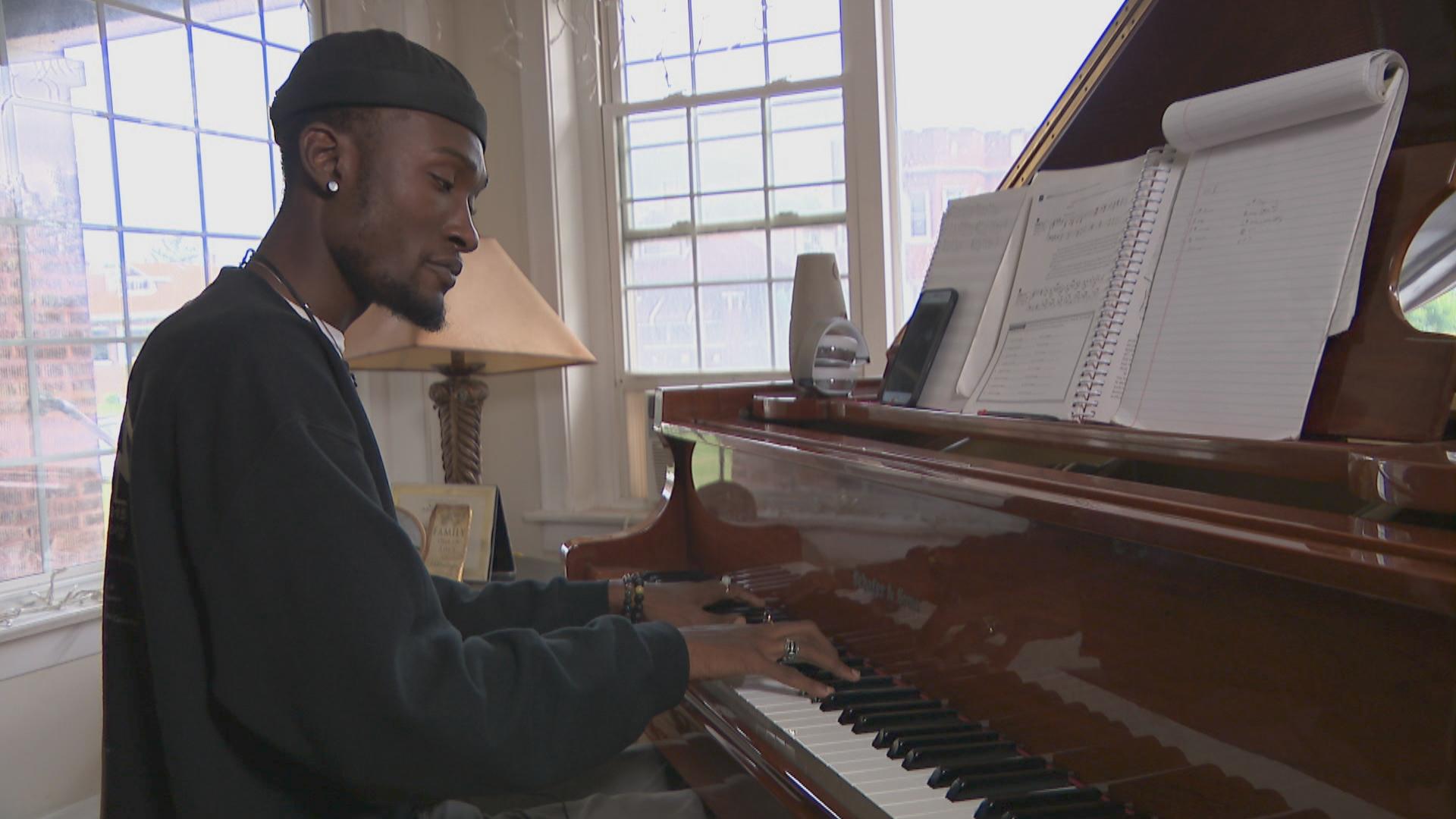
He composes on piano, including a new work commissioned by the Hyde Park Jazz Festival, that sonically explores 400-plus years of history of the African diaspora.
Isaiah Collier: Most people can't understand what it feels like to be uncomfortable for 400 plus. Everywhere you go you don't know how people are gonna see you, you can't even drive normally because you don't know, the police officers can pull you over just because.
We all got pain, whether we realize it or not. We just want people to understand ours.
So we offer this as a way for people to really understand. We understand it's not an easy subject but we have to, not want to, we have to. That's the only way any of this is going to go away. We have to address it.
Shefsky: He's in his senior year at Chicago State University, and also teaches master classes. He has advice for his students.
Isaiah Collier: There's a big difference between admiration and imitation and I prefer to just be aware of the admiration and admire certain things, but still know that's not myself.
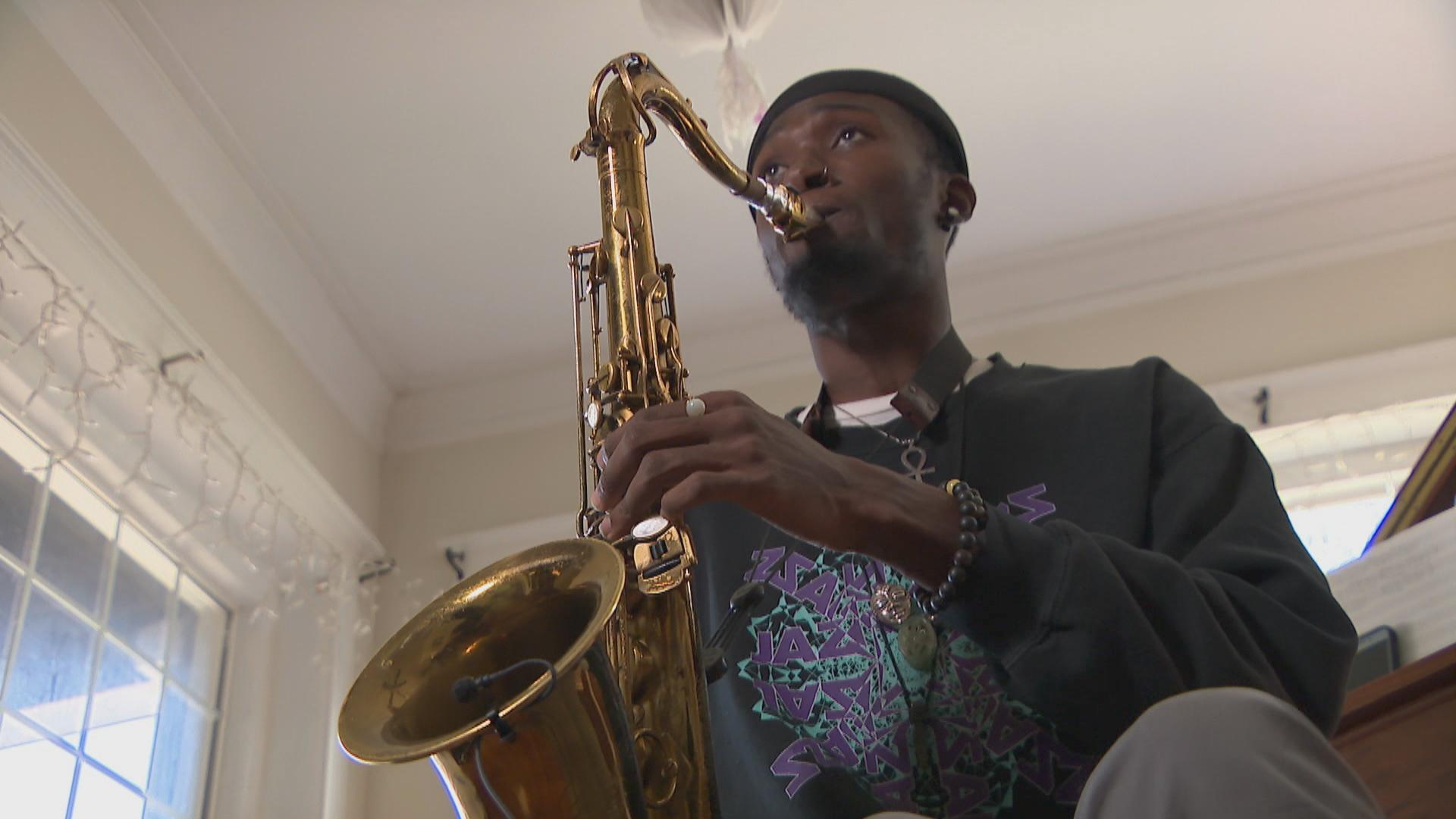
Shefsky: Collier just wrapped up work on an album of blues songs he composed.
His mother says she isn't just proud of her sons, she's grateful.
Cynthia Collier: What I'm most grateful for is that not only did they set their goals to achieve something in life, they stuck with it. And they're very passionate about everything that they do, so it makes it so much easier for us to push and encourage because they're happy, and they love what they do
Isaiah Collier: I think the most important thing is: being an artist, you have to show development. That's what made all the famous artists so great. Talk about Miles Davis, it wasn't that Miles was just, you know, the cool cat. Miles had a development.
We should not let anything limit us. People say the sky's the limit, I don't think that's true either. There's a whole galaxy above all this atmosphere. No matter how far we go, there's still something else.
Isaiah Collier and his band The Chosen Few debut his new work this Saturday at the Hyde Park Jazz Festival . The Festival also features performances by Orbert Davis, Maggie Brown and many others. Find out more on our website.
Related stories:
Creme Sheri Brings a Big Personality to All Things Jazz
Blues Prodigy Christone 'Kingfish' Ingram Hits Chicago
Chicago Jazz Orchestra Celebrates 40 Years of Big, Bold Sounds
1st Set Isaiah Collier & The Chosen Few
Isaiah Collier, has been turning heads in Chicago since his parents - struck by his maturity, self-assured and, above all, musicality - encouraged him to learn to read and play instruments fluently. Collier, an alumni of ChiArts, and the Jazz Institute of Chicago and has been playing around the Chicagoland area for the past 5 years.
Isaiah has played with a plethora of artist such as: Rene Marie, Chance the Rapper, Stefon Harris, Roy McCurty, Carmen Bradford, Ernest Dawkins, Bennie Maupin, Ari Brown, Robert Irving III, Lewis Nash, The AACM and many more. Being mentor by musicians such as Antonio Hart, Ari Brown, Willie Pickens, Ernest Dawkins, Bennie Maupin, James Perkins, Charles Heath, Bobby Watson, Denise Thimes and many more local greats.
Isaiah was a part of “Thelonious Monk Institute of Jazz All Star Peer-to-Peer Group” which was composed of five of the best high school student musicians around the country (2014-2017). Isaiah Collier, has performed for the” Thelonious Monk Trumpeter Competition at the Dolby theater and the White House. Isaiah Collier, with this amazing group of musicians had the distinctive honor to play before two Presidents of the United States of America, President Bill Clinton and President Barack Obama. Another highlight of being a part of this amazing group was being the last group to record with the legendary Rudy Van Gelder with Rudy overseeing most of the project. This group received a downbeat award after his passing (2016).
Isaiah has played at festivals such as: The Hyde Park Jazz festival, International Jazz Day at the White House, Englewood Jazz Festival, 51st Jazz Festival Sons D'hiver Jazz Festival in Paris, Chicago Jazz Festival, and Monterey Jazz Festival. An addition to Isaiah list of accomplishments he is a second year fellow at the “Dave Brubeck Institute" in Stockton, CA.
https://tamperejazz.fi/en/artist/isaiah-collier-the-chosen-few/

